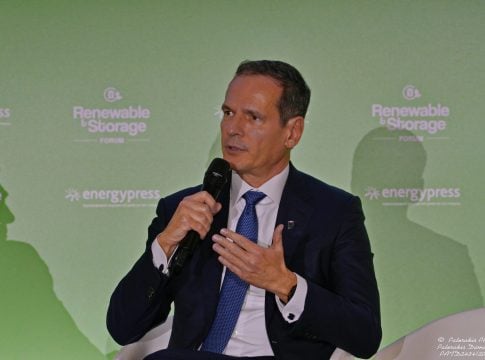Despite the significant progress of the last five years – the recovery of investment grade, the stable fiscal path and the impressive de-escalation of debt – Greece is still on a marathon path towards full economic convergence with the Eurozone, according to the responses of analysts from the major rating agencies to “Naftemporiki.”
More specifically, analysts were asked on the main challenge and opportunity for the Greek economy going forward and when Greece could realistically close the gap in per-capita income with the rest of the Eurozone.
Samuel Tilleray, Associate Director, Sovereign Ratings – Standard & Poor’s
“In the near term, the principal challenge for the Greek economy revolves around its elevated external imbalances, characterized by a high stock of external debt and a sizable current account deficit, which exposes the country to shifts in external financing conditions and reflects a structural overreliance on imports including hydrocarbons. Longer term, demographic and climate related challenges are the dominant concerns, both of which weigh on potential growth. On the other hand, the key opportunity stems from the potential for sustained fiscal outperformance and the continued execution of investment projects, which are both supporting solid economic growth in the near term and steadily improving the government’s debt dynamics, putting the net debt-to-GDP ratio on a firm downward trajectory and enhancing overall fiscal resilience.
“Based on our current projections, while Greece is on a solid convergence path with real GDP growth likely to outpace the Eurozone average in the near term, the gap in per-capita income is substantial and will take a considerable period to close meaningfully. Realistically, this is a multi-decade process, contingent on maintaining the current reform momentum to sustainably raise productivity, continued prudent fiscal policies that support debt reduction and enshrine fiscal space for investment, and successfully addressing long-term structural headwinds such as demographic pressures. A significant and sustained acceleration in productivity growth beyond current trends would be a key catalyst for narrowing this gap more rapidly.”
Greg Kiss – Fitch
“The Greek economy is on a steady growth path, despite the various recent external headwinds, including geopolitical and trade shocks. GDP growth has been around 2% since 2023, above the eurozone growth rate. The resilience of the Greek economy is primarily due to the improving domestic conditions, the acceleration of investments and improving household sentiment. We forecast growth to remain around 2% until at least 2027, above the eurozone dynamics. The key growth drivers will remain the domestic recovery, benefiting from the last years of the Next Generation investment stimulus, and further improvement in households’ balance sheets and steady employment growth.
The record activity of the tourism sector this year provides support to the export performance, a key contribution given the still high current account deficit.
The fiscal position of Greece is among the strongest in Europe with an overall budget surplus in 2024 and also likely this year. The strong starting position allows the government to implement personal income tax cuts in 2026 without jeopardizing the fiscal targets. The tax cuts, in turn, will further support the disposable income of households, strengthening the recovery in 2026 and 2027. The unemployment rate has declined below 10% in 2025, the lowest rate since 2008.
At the same time, the Greek economy still has persistent weaknesses as a legacy from the sovereign debt crises. The investment rate, although improving, is still below the eurozone average. The domestic savings rate is very low, thus Greece has a substantially current account deficit, reflecting the imbalance between domestic savings and investments.
The demographic challenges will intensify over the medium to longer term, another lasting adverse impact from the crises. Against this background the sound fiscal policy is a very important tool: the fast debt reduction since the pandemic will create fiscal space to absorb the aging costs over the next decades.”
“The Greek economy is on a steady convergence path towards the eurozone. However, our 2% medium-term growth potential forecast implies that the recovery will take a long time. Boosting productive investments will be a key component for the convergence process. The Next Generation stimulus has a big contribution in 2025-2026, as Greece is one of the most successful EU countries in absorbing the funds. The investment boost should prevail beyond 2026 to catch up with the investment ratios, and ultimately the capital stock of the EU.
The convergence of Greece can be compared to the Central and Eastern European EU members that joined in 2004 and 2007. Many of these countries were very successful with a fast convergence process based on FDI inflows, EU transfers and structural reforms that made the domestic economy, including the labour and product markets more flexible.
In purchasing power parity terms, which adjust for the differences in price levels across countries, Greece is now only around 70% of the EU average, while in 2004 it was close to 100%. Closing the gap will likely take decades. It will be like a marathon run, something Greece is familiar with since ancient times.”
Graffam, SVP, European Sovereign Ratings, Morningstar DBRS
“In a word, the main opportunity for the Greek economy is ‘investment.’ Investment as a share of GDP was 18% in 2024, up from 11% in 2019. Greece is the largest recipient of EU transfers, when you combine extraordinary COVID-recovery grants and loans, and ordinary EU budget transfers. These funds channel investments to improve physical infrastructure, human capital, and the digital and ecological transitions. They are also accompanied by structural reforms in areas like business and public administration. Increased investment provides a unique opportunity for the Greek economy to shift into higher value-added sectors, increase productivity, and improve long-term competitiveness.
While our upgrade of Greece from BBB (low) to BBB in March 2025 reflected the receding legacy risk in the banking system and decreasing debt burden, our Stable Trend remains supported by institutional and economic reforms that have enhanced the resilience of the Greek economy.
There are nevertheless lingering structural challenges that constrain the Greek economy. To begin with, Greece’s public debt ratio is still the highest in Europe. Likewise, the country’s regulatory environment remains comparatively burdensome, as bureaucratic processes can interfere with the ease of doing business. There are also structural weaknesses in the Greek labor market, including high youth unemployment and skills mismatches, and the country faces serious demographic challenges linked to the aging population and emigration of the younger educated workforce.”
“We expect per-capita income in Greece to continue to improve, as reforms and investments enhance the productive capacity of the economy. However, I would not expect Greece to converge towards the eurozone average on wealth and productivity metrics anytime soon. GDP per capita in Greece was roughly 52% of the Euro area in 2024, according to the IMF. This remains below 2010 levels (59%).”
Moody’s: Strong progress, but structural obstacles persist
banking sector.”
“Our score of fiscal policy effectiveness reflects the strong focus of the government to maintain prudent fiscal policies, marked by increasing primary surpluses and a reduction in the debt burden. We see the commitment to reform implementation and fiscally prudent policies as credible and strong, supported by the government’s solid parliamentary majority as well as the broad consensus in society for these policies,” the credit rating added.
According to the analysis, Greece also faces an adverse demographic profile due to population ageing. “The share of the working age population in the total population will shrink by ten percentage points until 2050, according to Eurostat projections,” it stated.
Greece, according to the four rating agencies, has left the crisis era behind and has built credibility.
However, true European convergence is not a matter of a few years. It is a long, multi-layered effort that requires steady reforms, productive upgrading, and social resilience — or a marathon that only consistency can win.















